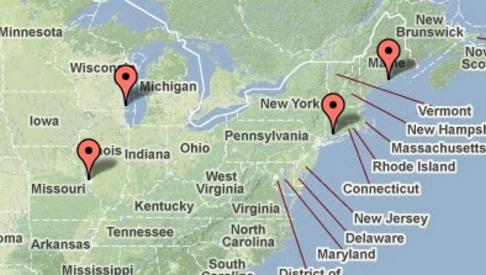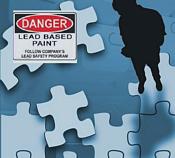Now, RRP Renovators Can Keep An Eye On Big Brother!
Many renovators have expressed concerns about what the EPA is and/or will be doing regarding enforcement of the RRP Rule. Those who are operating illegally are concerned that EPA may find them and inspect, those who are abiding by the rule are wondering when EPA will do inspections and catch their illegal completion. Now, thanks to the folks at Check4Lead, renovators have an on-line tool to report and view EPA RRP Inspections across the country. Essentially, the tool allows renovators to keep an eye on “Big Brother”.
The new tool, called EPA Audit Tracker, allows visitors to view the locations of EPA and OSHA inspections related to RRP on a Google Map. Pin drops appear on the map to mark the location of audits and a variety of different pin drops are used to distinguish between the government agencies doing the audits. The tool has just been released, so there are not a lot of pin drops yet. I suspect that will change quickly as renovators become aware of the tool and contribute.

The tool is very easy to use. To report an audit, users can click on the report icon to open a reporting screen. When the reporting screen opens there is a text box call “your Story” where visitors can report the audit, share details of the audit and express their opinions. A zip code field is used to locate the pin drops on the map and a valid e-mail address for the person posting the report is required.
Scott Turman, an owner and product manager at Check for Lead LLC tells me that reports will be manually reviewed for validity and appropriate langauge before being posted to the map. He also told me, using the required e-mail address; his staff may actually contact the person reporting the audit to verify the report. After the pin drop is added, visitors can click on the pin drop to view the report.
 In my opinion this tool will be helpful for those renovators following RRP requirements for a variety of reasons. For example, it will help level the playing field for legally operating businesses if the awareness of audits persuades illegal businesses to change their ways. Because the tool allows those reporting audits to include details about the audit, renovators will learn what to expect and how to better handle an audit if one happens to them. Also, for those who like to help their peers, being able to submit a report that is informative and shares constructive advice becomes a win-win for both the reporter and those who read the reports.
In my opinion this tool will be helpful for those renovators following RRP requirements for a variety of reasons. For example, it will help level the playing field for legally operating businesses if the awareness of audits persuades illegal businesses to change their ways. Because the tool allows those reporting audits to include details about the audit, renovators will learn what to expect and how to better handle an audit if one happens to them. Also, for those who like to help their peers, being able to submit a report that is informative and shares constructive advice becomes a win-win for both the reporter and those who read the reports.
 On the other hand, the tool will not likely be helpful to those who knowingly and willfully violate the rule. Knowing where EPA, OSHA and/or states agencies are doing inspections or audits won’t be much help in hiding from an inspector. As we have seen, job site inspections are not likely. Removing magnetic signs or parking their trucks out of view won’t protect violators from an audit. The required documentation gives the authorities the ability to retroactively inspect work practices as well as compliance with owner and occupant pre-notification requirements. Because the EPA rule dictates that all required documentation be kept for three years, one visit to a renovator’s office by EPA can uncover enough violations and justify enough fines to put an illegal business out of business. The Massachusetts requirement for storing documents is 10 years, giving illegal businesses in that state much more to be worried about.
On the other hand, the tool will not likely be helpful to those who knowingly and willfully violate the rule. Knowing where EPA, OSHA and/or states agencies are doing inspections or audits won’t be much help in hiding from an inspector. As we have seen, job site inspections are not likely. Removing magnetic signs or parking their trucks out of view won’t protect violators from an audit. The required documentation gives the authorities the ability to retroactively inspect work practices as well as compliance with owner and occupant pre-notification requirements. Because the EPA rule dictates that all required documentation be kept for three years, one visit to a renovator’s office by EPA can uncover enough violations and justify enough fines to put an illegal business out of business. The Massachusetts requirement for storing documents is 10 years, giving illegal businesses in that state much more to be worried about.


 Looking for accurate information about the EPA RRP rule?
Looking for accurate information about the EPA RRP rule? 


